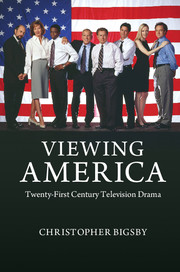Book contents
- Frontmatter
- Contents
- List of Illustrations
- Preface
- Miscellaneous Frontmatter
- Introduction
- Washington
- New Jersey
- Baltimore
- Chapter Three Homicide: Life on the Street (NBC 1993–1999)
- Chapter Four The Corner (HBO 2000)
- Chapter Five The Wire (HBO 2002–2008)
- Earth
- Odessa
- Baghdad
- New York
- New Orleans
- Notes
- Bibliography
- Index
Chapter Three - Homicide: Life on the Street (NBC 1993–1999)
Published online by Cambridge University Press: 05 June 2014
- Frontmatter
- Contents
- List of Illustrations
- Preface
- Miscellaneous Frontmatter
- Introduction
- Washington
- New Jersey
- Baltimore
- Chapter Three Homicide: Life on the Street (NBC 1993–1999)
- Chapter Four The Corner (HBO 2000)
- Chapter Five The Wire (HBO 2002–2008)
- Earth
- Odessa
- Baghdad
- New York
- New Orleans
- Notes
- Bibliography
- Index
Summary
Edgar Allen Poe, father of detective fiction, died in Baltimore on 7 October 1849. There was no autopsy and, perhaps appropriately enough, no determinable cause of death. Was it murder or suicide? According to a 1996 issue of Maryland Medical Journal, it may have been rabies (a suggestion picked up in ‘Everlasting Life’, the episode which concluded the first television crime series filmed in Baltimore: Homicide: Life on the Street). Nobody seems to have been over-concerned. There was, anyway, something apt about such an end for a man whose concern with the mysteries of the subconscious was paradoxically fused to a fascination with rational process. The human mind, it seemed, was alternately anarchic, given over to the primal, and committed to the idea of order, the revelatory power of thought.
His world was dark with disordered passion and bright with revelatory insight. He was fascinated by the killer and compelled by his nemesis, the detective, slowly unpeeling truth, dismantling the wall of deceit behind which lay the consequence of sudden violence. The detective was ostensibly the scientist, assembling evidence, adducing data, coldly analytic (though Auguste Dupin depended on flashes of insight). He was the obverse of Poe's gothic characters, in thrall as they were to passions they could neither control nor understand, feelings that could not be named, threatening as they were not simply to social order but to any sense of moral structure. Their feelings were buried deep, except that they could never stay immured. Their acts extended the spectrum of human behaviour, and in doing so were seemingly a memory of an earlier feral stage of development.
- Type
- Chapter
- Information
- Viewing AmericaTwenty-First-Century Television Drama, pp. 109 - 165Publisher: Cambridge University PressPrint publication year: 2013



